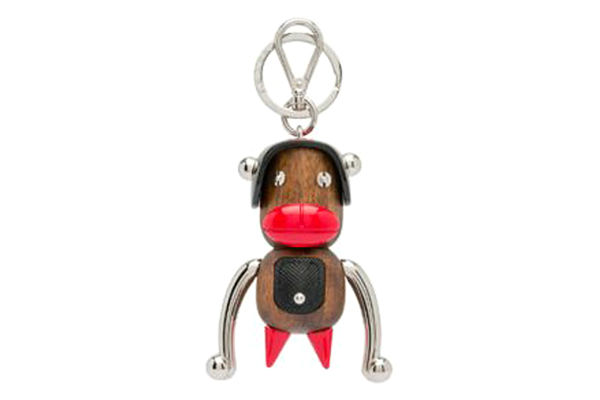 The New York City Commission on Human Rights today announces a landmark settlement with design house and luxury retailer Prada USA Corps. Following a national outcry over the display and sale of its “Pradamalia” merchandise in December 2018, the Commission immediately issued a cease and desist letter and launched an investigation into the company. The monkey figurine from the collection evoked images of Sambo, a caricature that, over generations, has been used to mock and dehumanize Black people. The display of such racist iconography manifests as discrimination on the basis of race, suggesting that Black people are unwelcome.
The New York City Commission on Human Rights today announces a landmark settlement with design house and luxury retailer Prada USA Corps. Following a national outcry over the display and sale of its “Pradamalia” merchandise in December 2018, the Commission immediately issued a cease and desist letter and launched an investigation into the company. The monkey figurine from the collection evoked images of Sambo, a caricature that, over generations, has been used to mock and dehumanize Black people. The display of such racist iconography manifests as discrimination on the basis of race, suggesting that Black people are unwelcome.
The settlement requires that Prada invests in restorative justice efforts to combat anti-Black racism and promote diversity and inclusion in Prada’s business activities, advertising, and products.
Prada will:
- Ensure that NYC employees and Milan executives receive racial equity training.
- Develop a scholarship program for people historically underrepresented in fashion
- Within 90 days, present the commission with CV of candidates for a senior, director-level diversity and inclusion officer who will review Prada’s advertising and products sold in the United States, as well as review and monitor Prada’s anti-discrimination policies
- Maintain Prada’s Diversity and Inclusion Council, launched by Prada in February of 2019, with a minimum of 3-5 members for a period of at least 6 years, with regular reporting by Prada on the council’s progress to the Commission.
- Consult with Dr. Joyce Brown, president of the Fashion Institute of Technology, who sits on the Diversity and Inclusion Council.
Additionally, the settlement requires all of Prada’s NYC employees to undergo New York City Human Rights Law training by a licensed attorney with substantial knowledge of anti-discrimination training. Prada worked willingly and collaboratively with the Commission to reach the terms of the settlement.
“The de Blasio Administration is committed to protecting the rights of all New Yorkers to live free of racial bias and discrimination,” said J. Phillip Thompson, Deputy Mayor for Strategic Policy Initiatives. “To see a symbol of Jim Crow era oppression sold as a luxury bauble is a critical reminder that there is still work to be done. By engaging Prada with communities who have been historically excluded from the luxury fashion industry, today’s settlement is an important step towards achieving positive social change in New York City.”
“I am so proud of the work of the NYC Commission on Human Rights on this conciliation agreement,” said Carmelyn P. Malalis, Chair, and Commissioner of the New York City Commission on Human Rights. “Every day our staff strive to better the lives of New Yorkers and create a lasting impact to strengthen human rights. Today’s conciliation does exactly that – it recognizes the harm of racist iconography, demands accountability from Italy to New York City, and charts a path forward to greater inclusion and respect for Black people. The restorative justice measures required in this settlement may today be considered unconventional for law enforcement, but my hope is that government, here in New York City and Across the country, continue to think outside the box to address and remedy historical and current harms perpetrated through anti-Black racism.”
In seeking to create long-lasting change in organizations that violate the law, the Commission is increasingly focused on incorporating program-based solutions such as those mandated in this settlement. Restorative justice programs strive to improve the culture within these organizations for those directly affected by the discrimination. With roots in indigenous communities, a restorative justice framework seeks to reconcile parties rather than focus on punishment for wrongdoing. Restorative justice is a common alternative within the criminal legal system; however, the Commission is among the first civil rights law enforcement agencies in the nation to adopt these practices.
The first-of-its-kind conciliation agreement was negotiated by NYC Commission on Human Rights Supervising Attorney Demoya Gordon. As required by the agreement, Prada will launch a scholarship program that will run for a minimum of two years and is subject to oversight by the Commission. The scholarship program will partner with fashion schools and other fashion-related organizations in New York City, such as Harlem’s Fashion Row and the Fashion Institute of Technology, to create and increase employment opportunities within the fashion industry for students from historically underrepresented backgrounds.
The settlement also requires Prada to hire a permanent, executive-level diversity and inclusion officer who will ensure that Prada’s U.S. business activities, advertising, and products comply with the NYC Human Rights Law. The diversity and inclusion officer will review Prada’s designs, anti-discrimination policy, and will provide oversight to ensure Prada’s activities are conducted in a racially equitable manner. Prada has 90 days to provide the Commission with potential candidates to consider.
Further, Prada is consulting with Dr. Joyce Brown, president of the Fashion Institute of Technology, as a fashion consultant on racial equity across Prada’s business. Dr. Brown sits on the recently created Diversity and Inclusion Council at Prada. All New York employees and specific Milan executives of the fashion house will undergo racial equity training.
The NYC Commission on Human Rights has broad discretion to tailor relief to address the harm caused by discrimination. The Commission may order the payment of monetary damages for the emotional harm caused by discrimination, civil penalties for violations of the Law, policy changes, training, and other affirmative remedies.
“The terms negotiated in this settlement are some of the most unique and progressive I have seen in my time as a practicing attorney,” said Sapna V. Raj, Deputy Commissioner of the Law Enforcement Bureau of the NYC Commission on Human Rights. “The measures Prada has committed to have far-reaching implications for the fashion industry as a whole. Thanks to Ms. Ezie who bravely spoke out the message is clear: the painful history of American racism is not for sale. I am glad a name like Prada is leading the charge in creating institutional change for this industry.”
Chinyere Ezie, a staff attorney at the Center for Constitutional Rights, raised the “Pradamalia” merchandise to the Commission in December 2018 saying, “I was shocked to see Blackface and Sambo images in a Prada Soho window display in 2018. This iconography has been used throughout history to mock and demean Black people and strip us of our humanity–oftentimes in response to our efforts to assert our rights. It was a cruel reminder of how history continues to repeat itself.” Ezie worked with the Commission and Prada on portions of the restorative justice elements of the agreement.
The Commission mandated restorative justice measures in a recent settlement with the upscale Hershberger Salon and Sharon Dorram Color after employees experienced discrimination on the basis of wearing natural hairstyles. The Commission required the salon to develop an internship program; training in the care, styling, and maintenance of natural Black hair for all employees of the salon; and community service with a group that uplifts and promotes natural hair and Black beauty.
The New York City Human Rights Law, one of the most protective in the nation, prohibits discrimination based on race, color, national origin, immigration status, and over 20 other protected classes in housing, employment, and public accommodations. If you have experienced discrimination call the NYC Commission on Human Rights by dialing 311 and asking for Human Rights, or by visiting the Commission’s website at NYC.gov/HumanRights.
“Today this settlement demonstrates that government can be a powerful instrument towards restoring and repairing the bitter and vicious harms of institutional and intentional racism,” said New York City Human Rights Commissioner and Executive Director of the National Economic and Social Rights Initiative Cathy Albisa. “By recognizing that true accountability requires sustainable institutional change and embracing restorative justice towards that end, the Commission is once again leading in transforming our system from one of individual conflict and punishment to one grounded in a collective commitment to equity and justice.”
“We are pleased that the case has settled, grateful to the Human Rights Commission for following this through, and proud of Chinyere for standing up for justice and achieving real results,” said Vince Warren, Executive Director of the Center for Constitutional Rights. “Black History Month reminds us of the injustices of the past, but it also strengthens our resolve that no one should be forced to endure racism in this day and age.”
“This case illustrates how restorative justice can ensure a deeper and more active expression of accountability than what is typically possible through a conventional legal process,” said Erika Sasson, Director of Restorative Practices, Center for Court Innovation. “Equally important is the unique opportunity restorative justice provides for the whole community to address the broader norms and historical traumas that are fostering harm.”
Photo credit: Prada.
Become a Harlem Insider!
By submitting this form, you are consenting to receive marketing emails from: Harlem World Magazine, 2521 1/2 west 42nd street, Los Angeles, CA, 90008, https://www.harlemworldmagazine.com. You can revoke your consent to receive emails at any time by using the SafeUnsubscribe® link, found at the bottom of every email. Emails are serviced by Constant Contact








